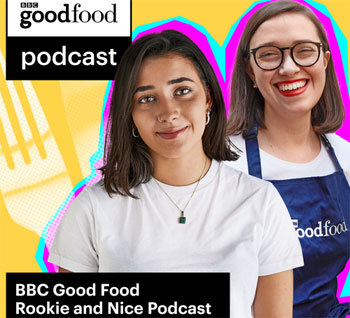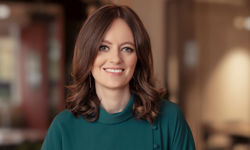
Dominated by the global pandemic, 2020 is a year most of us would surely like to forget. But for Christine Hayes, editor-in-chief of BBC Good Food and Olive, it was her most challenging, transformational and – professionally-speaking – satisfying.
She is talking about the service the BBC Good Food (BBCGF) brand gave its users during an unprecedented and deeply challenging time, she is quick to qualify. And when you consider how the brand accelerated in March 2020 and the months that followed, you can see her point.
We thought: panic, boredom, new normal and hardship – though, a bit like the stages of grief, not necessarily linear.
Calm before the storm
The year began quietly.
“Things were looking pretty rosy,” Hayes recalls. “We had a record-breaking January – with something like 104 million page views on BBCGoodFood.com, and 27 million uniques globally. We were beating our own records. Magazine sales were steady. So, things were pretty good, really.”
A twelve-month plan had been agreed.

“Apart from our verticals – family, health and reviews which, along with recipes, are our known pillars where we put a lot of time and attention – we also had ambitions for three big content themes: Sustainability, Learn With Us, and How We Eat Now,” she pressed on.
“As Britain’s biggest food media brand, we have a lot of data from our users and like to stretch ourselves and push what we do with content, so those were the areas we intended to focus on. And looking back, we kind of did.”
All plans were thrown up in the air by the first lockdown, however.
“The week before we were all sent home, I remember looking at our social and thinking ‘This feels like our normal content, not like we’re responding to what’s about to happen’,” she admits.
So, she convened a hasty summit – also involving BBCGF Group Digital Editor Lily Barclay, BBCGF Magazine Editor Keith Kendrick and BBCGF Managing Editor Lulu Grimes – at which a formula was devised envisaging four stages the crisis would likely involve.
“We thought: panic, boredom, new normal and hardship – though, a bit like the stages of grief, not necessarily linear,” Hayes explains.
This resulted in a content campaign under the banner ‘Stay Home Get Cooking’.
The aim was to provide comfort and guidance and not just to the brand’s existing audience. The team also set themself the task of encouraging the whole nation to get connected through cooking. Oh, and helping people manage anxiety. And keeping kids entertained and well fed.
One of the great things about BBC Good Food is we have instincts and experience, but we are also very data-led – a great combination.
Emotional connection
“As a brand, we’ve always been there to help someone who wants to know how to poach an egg or cook a Sunday roast or wean their kids to offer help,” she says. “This was about broadening it out and doing so with a more emotional feel.”
A primary focus was on social.
“From early on, we had our cookery team producing live Q&As each weekday to address cooking without staples like flour, how to use up things you’ve stockpiled like chickpeas, or what to cook kids for lunch at home,” Hayes explains.
“It was all about giving people instant access to (and, also, reassurance from) our team. This was great for deepening emotional connection, which was also helped by the fact our teams faced the same shortages everyone else did.
“There were no secret phone lines to Ocado. We still had to scavenge, just like everyone else.”
This instant access was highly popular, and not just with the audience as the team really loved the daily interaction and the feeling they were making a difference.
Prior to the first lockdown, BBCGF had devised a new video strategy and taken on a number of new production staff. This was also quickly revised, with production turned remote. Six series, all filmed by the brand’s cookery teams on their own phones at home, were then shot, directed via Zoom.
“In the end, we produced over 100 new episodes of original video content and 60 live Q&As and they were pretty successful – together generating around 90m views and increasing our potential video views by more than 400%,” Hayes reveals.

The brand’s podcast strategy was evolved, too, to make content more relevant and reactive.
Webinars were another area on which the team focused – creating how-to style content for a segment of the audience Hayes refers to as ‘hobbyists-plus’, such as sourdough obsessives. This was so successful it will continue after the pandemic crisis lifts, and webinars are now planned for non-recipe focused areas.
A Facebook community – BBC Good Food Together, which now has 60,000+ members – was launched. The team also put together a cookbook. And as if all that wasn’t enough, there was a restructure with the bringing together of BBC Good Food with its sister food brand Olive into a single multi-brand, multiplatform team, towards the end of the year.
After the first few live Q&As, it was apparent how “all of a type” many of the team were.
Newsroom approach
To manage all of its additional digital content, BBCGF introduced a ‘newsroom approach’. This involved everyone starting each weekday with a 9am conference to go through the stats relating to what people had been looking for online in the preceding 24 hours.
The strategy was made easier by the fact that BBCGF had previously instigated a content hub, Hayes points out. This brought together its digital journalists and cookery writers, so they were already used to working closely.
Proof of the pudding was the volume and relevance of the output – up to 20 new pieces of content produced to meet audience needs each day – and the significant uplift in audience and engagement.
In April 2020 alone, BBCGF’s website generated 215 million page views with 53 million global users. By late December, the page views had hit 1.4 billion – up 69% year-on-year.
According to its latest ABCs (H2, 2020), meanwhile, BBC Good Food magazine’s circulation across print and digital was up 10% year-on-year to 200,039 (a period-on-period rise of 27%) with subscribers up 26% year-on-year to 130,936.
“It was very motivating. Everyone was excited by it, and it was a successful time for us because all these people were turning to us for help and we were delivering,” Hayes recalls.
“One of the great things about BBC Good Food is we have instincts and experience, but we are also very data-led – a great combination. The audience is at the heart of whatever we do, and never more so than when they needed us.”
She continues: “We were really listening and we were really giving them what they wanted. At the same time, there were people coming to us who’d never cooked before or didn’t know what to do with the food they could get. So, we were also growing the audience.”
It wasn’t all about recipe content, however.
“We are known as a very practical brand, which we are. But we also knew people had emotional needs, and by putting our team out there, we really upped the emotional connection,” she explains.
“That was really important. And, I think, it has also proved quite transformative. We learned fast, so we had to act faster. And to act faster, we took a few more risks.
We’ve seen we can create work – our best work – by working in this new way.
Mixing it up
2020 was also transformative in another important – if, perhaps, less immediately obvious – way, relating to diversity and inclusion.
“If I’m really honest, we hadn’t done enough in this respect,” Hayes readily admits. “There are always things in the pipeline. But what we realised in 2020 was, given our scale, how important it was for us to really put our money where our mouth is.”
After the first few live Q&As, she says, it was apparent how “all of a type” many of the team were.
“So, we transformed our brand with new writers, columnists, recipe writers and video presenters. But there is still a lot of work to do to ensure we represent our exiting audiences as well as attracting new ones,” she continues.
Food should really be about bringing people together and exchanging ideas and stories, she believes, so 2020 catalysed the team around doing much more of it.
“We have a responsibility to platform voices who sadly are just not heard enough in food media, and we’ve really made an effort to evolve our content to make it richer and more relevant to living today,” says Hayes.
This strategy also involved commissioning more inclusive content; launching a campaign called ‘We Are BBC Good Food’ to celebrate its new and existing contributors; a food audit to identify under-represented cuisines in its coverage with a commitment to plugging the gaps; and a digital diversity scheme to remotely mentor young writers.
On top of this, there is now also a plan to write an inclusive BBC Good Food style guide – initially for its own use, but with eventual potential to roll it out for other food media.
“We are a heritage brand, but this year, we have completely transformed our content and we’ve kept people with us and grown the audience. It is really good to see it’s appreciated, and the audience has come with us,” she says.
A bigger and bolder D&I commitment is just one of a number of developments from 2020 that will continue moving forward.
“Working flexibly and the trust we put in our teams has really paid off, and we’ve seen we can create work – our best work – by working in this new way,” Hayes believes.
“We’ve great people here, they really rose to the challenge. I’d be very surprised if we go back to working in the old way. And I’m very excited about seeing how we will use the space we do have at Immediate in the future in new and creative and more collaborative ways.”
Forced to manage new complexities and communicate better to work effectively remotely has created “a more cohesive, high-functioning team”.
Looking ahead, things will continue to evolve – and accelerate.
“It’s not enough to be happy with being the country’s number one media food brand, we must be proudly protective of it – which means understanding in ever closer detail everyone is unique with different tastes, lifestyles and dietary requirements, then giving them the right experiences on whichever platform they choose to engage with us,” Hayes says.
“What’s in the pipeline will happen quicker. We will get to know our audience even better, too. As technology evolves further, offering people ever-more useful personalised content that works for them is the way ahead.”
As technology evolves further, offering people ever-more useful personalised content that works for them is the way ahead.
This article was first published in InPublishing magazine. If you would like to be added to the free mailing list, please register here.










